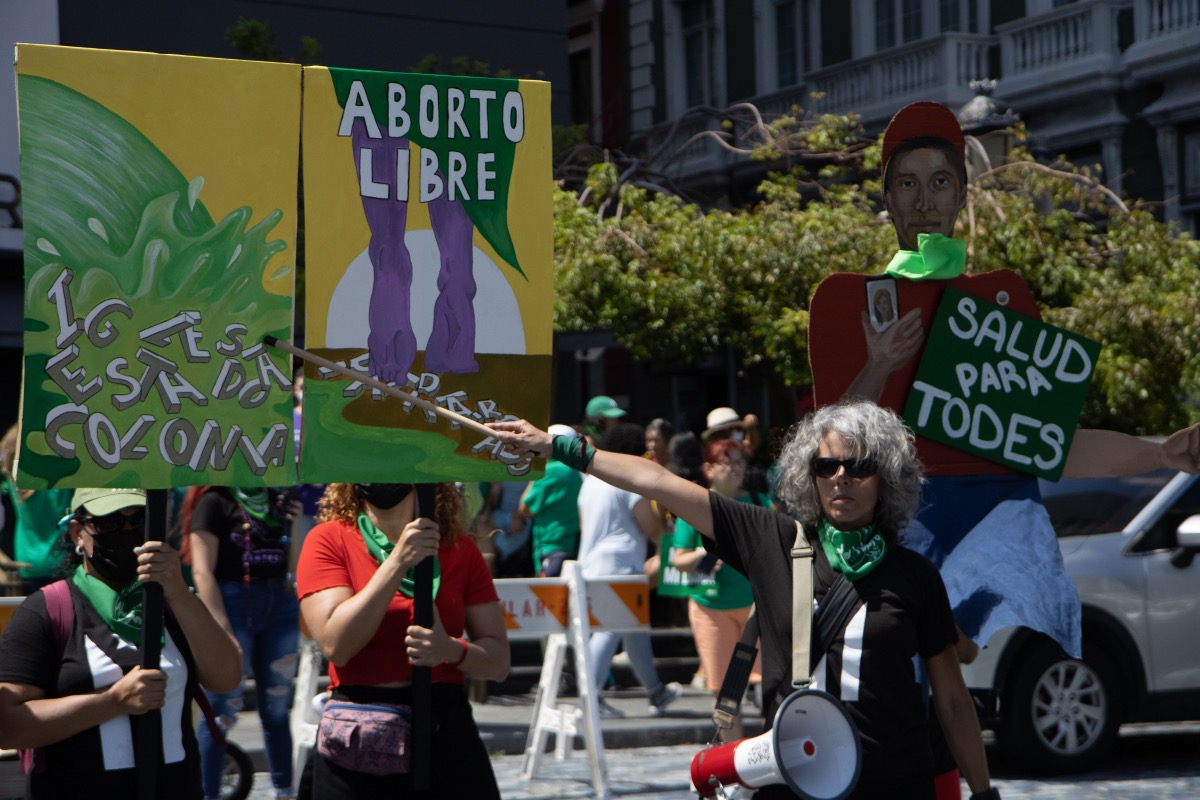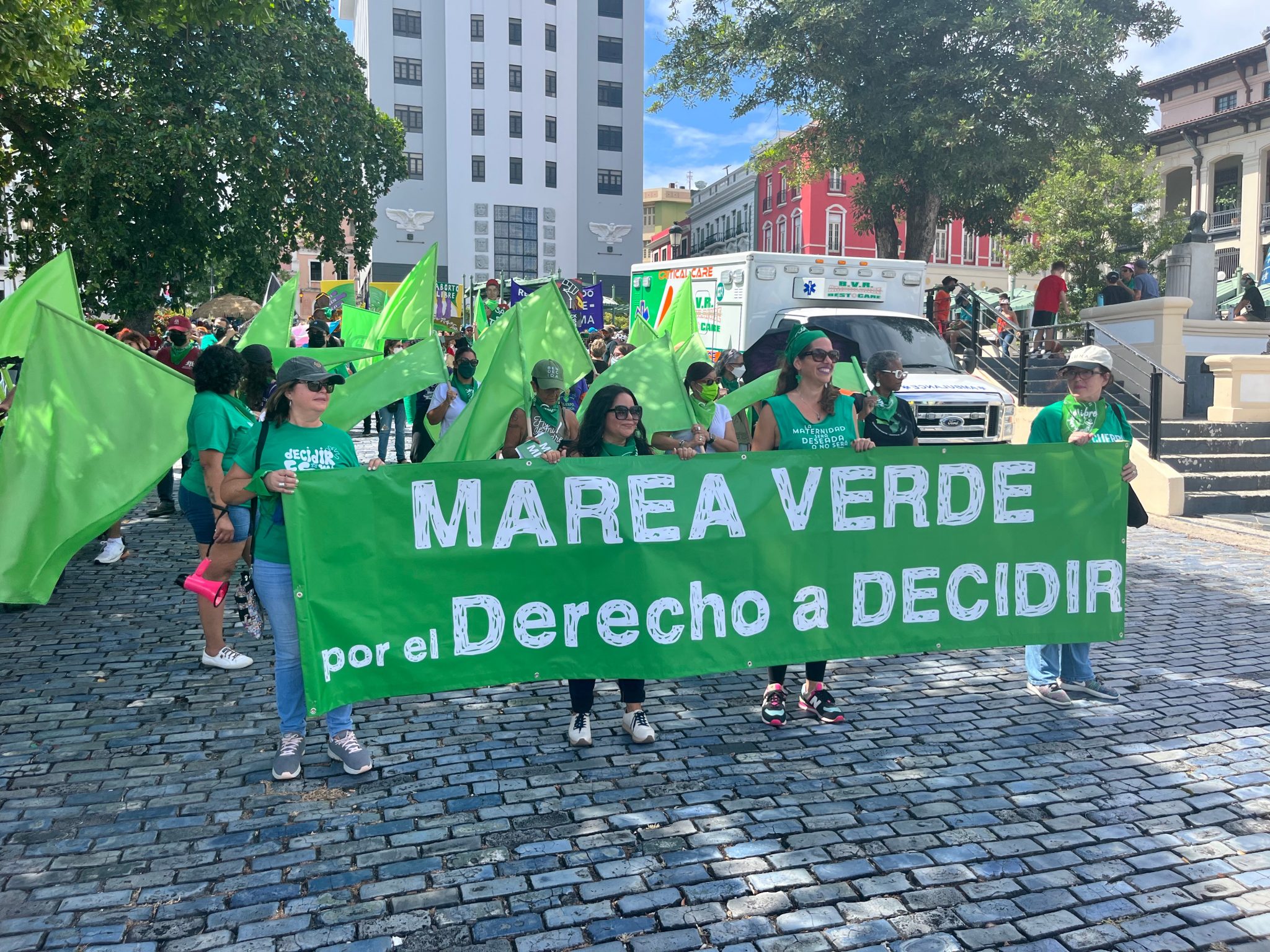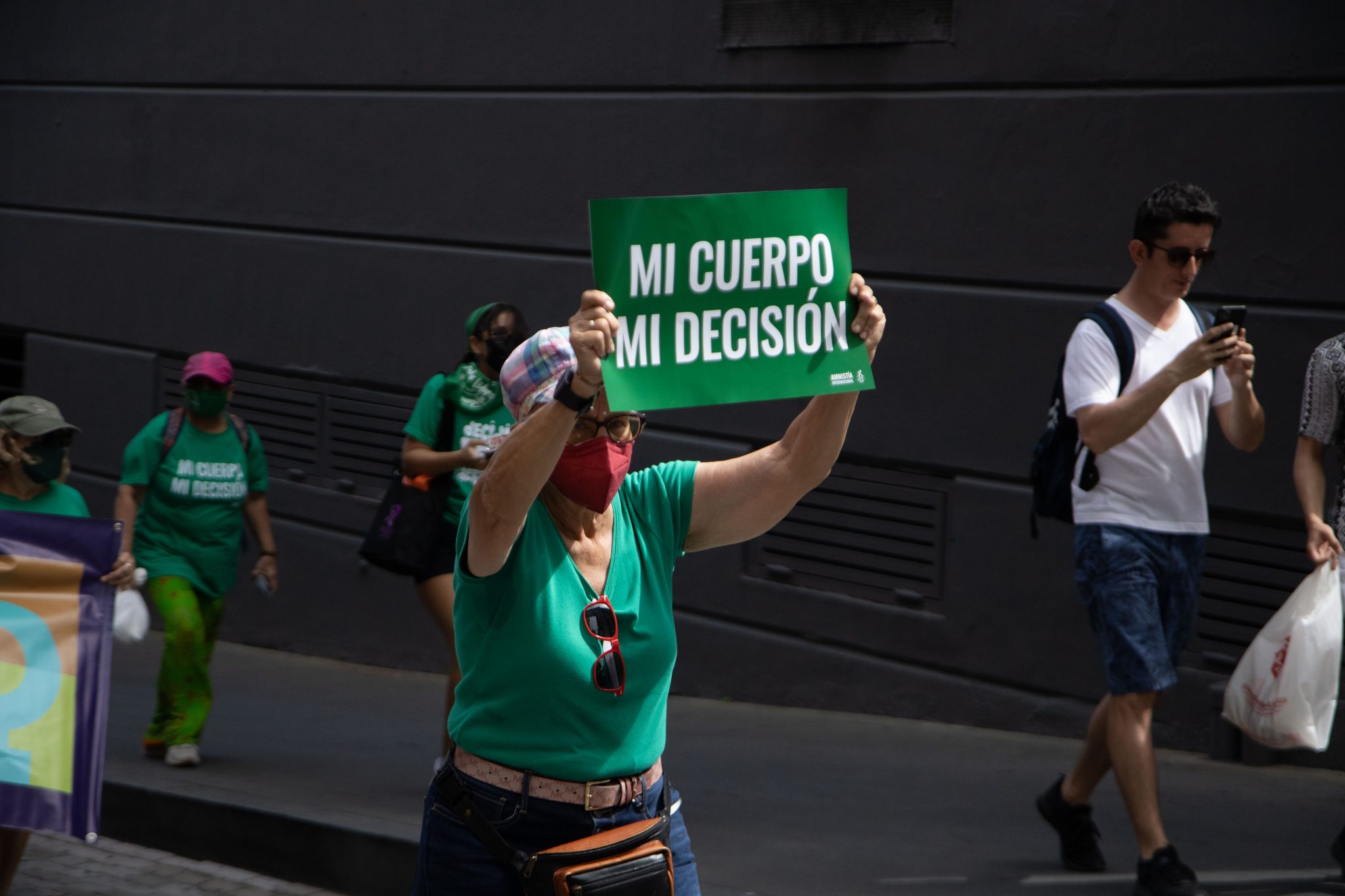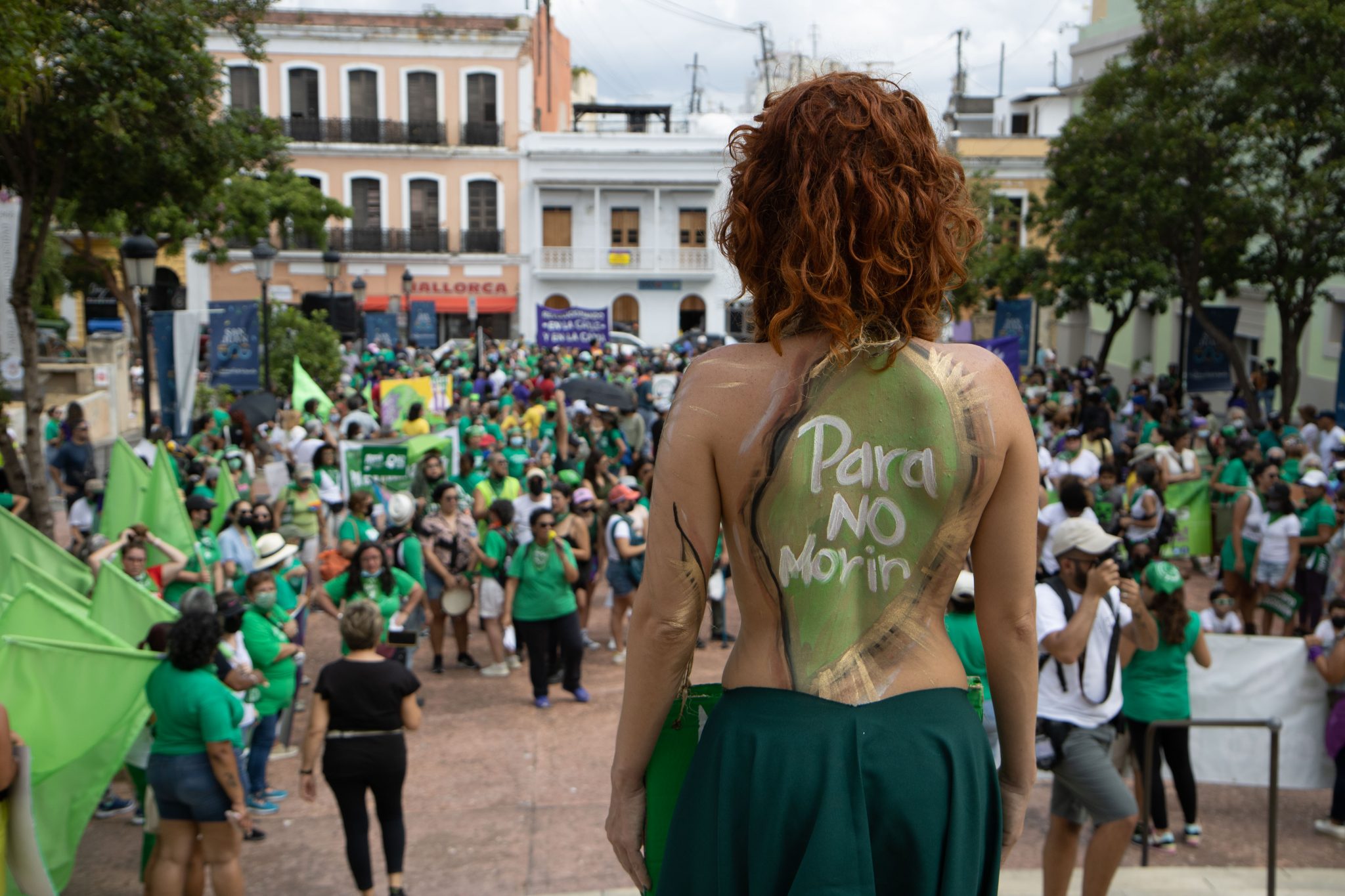

A protester points to placards that read “CHURCH STATE COLONY” and “FREE ABORTION,” a slogan of the abortion rights movement in Latin America, San Juan, Puerto Rico, Saturday, May 28, 2022. (Carlos Edill Berríos Polanco/Latino Rebels)
SAN JUAN, Puerto Rico — A green wave of pro-choice demonstrators washed over Old San Juan on Saturday, May 28 —the International Day of Action for Women’s Health— to demand abortion rights be protected in the face of legislative attacks.
Following a leaked draft ruling by the U.S. Supreme Court that signaled it was moving to overturn Roe v. Wade, and a push to limit abortion at 22 weeks by the Puerto Rico Life and Family Commission with Senate Project 693 (PS 693), pro-choice activists gathered in front of the Jose V. Toledo Courthouse in Old San Juan for a “Marea Verde por el Derecho a Decidir” (Green Wave for the Right to Decide) to protest against the assault on reproductive rights.


Protesters dressed in green, a symbol of the abortion rights movement, carry a banner which reads “Green Wave for the right to choose,” San Juan, Puerto Rico, Saturday, May 28, 2022. (Carlos Edill Berríos Polanco/Latino Rebels)
“They are two threats that come from different routes but both are equally dangerous,” Puerto Rico Independence Party Sen. María de Lourdes Santiago told Latino Rebels.
She classified PS 693 as setting a “very dangerous precedent” for the political sector to establish its own criteria over the medical sector.
“If it’s approved through one way or another, the resulting limitation to a safe abortion will be like before Roe v. Wade—unsafe abortions in very dangerous conditions. And the terrible irony is that these proposals come from sectors that have no commitment neither to maternity nor to children nor to child-rearing,” she explained.
Organized by Aborto Libre PR, an organization that strives for free, legal, and safe access to abortion, the event counted support from over 50 reproductive rights, social justice, and medical groups. The demonstrators marched through the cobblestone streets on their way to the Capitol, chanting slogans like “Take your rosary out of my ovaries and your doctrines out of my vagina!” and “If they’re old enough to give birth, they’re old enough to decide!” Once they reached the seat of government, the Barrileras de 8M organized a drum circle and dancers.
Most everyone is gathered around the drum circle watching the performances pic.twitter.com/VndYQpbxHN
— Carlos Berríos Polanco ⚰️ (@Vaquero2XL) May 28, 2022
“In the local context, where there’s such an aggressive campaign to intervene in people’s reproductive decisions, we thought it very important to frame the Women’s Health Day as one in defense of sexual and reproductive rights and abortion rights,” Aborto Libre PR spokesperson Mayra Díaz Torres told Latino Rebels.
Many U.S. states have already set “trigger laws“ that would go into effect immediately if Roe v. Wade were overturned. Oklahoma has passed the United States most restrictive abortion ban, limiting abortion from the stage of fertilization onwards with few exceptions.
In Puerto Rico, however, access to abortion would not be heavily affected since the Puerto Rico Constitution enshrines a person’s right to privacy as fundamental.


A protester holds up a sign that reads “MY BODY MY DECISION” during an abortion rights march, San Juan, Puerto Rico, Saturday, May 28, 2022. (Carlos Edill Berríos Polanco/Latino Rebels)
The right to privacy is “broad and extensive enough to include a woman’s right to decide whether to continue her pregnancy until delivery,” according to a report written by law professors Jorge Farinnaci Fernós and María Dolores Fernós López-Cepero for AMICUS magazine. Additionally, cases like El Pueblo de Puerto Rico v. Duarte Mendoza (1980) and Pueblo v. Najul Báez (1983) further protect a person’s right to access an abortion.
Nevertheless, many pro-choice activists deem any attempt to restrict a person’s access to abortion as an attack on every person’s access abortion.
“If they touch one of us, they touch all of us!” the crowd yelled as they marched.
Every protester wore the green bandana as a symbol of unity and reproductive rights. The bandanas, whose color is unofficially known as “legal abortion green,” were first worn by reproductive rights demonstrators in Argentina in the first “Green Wave” in 2018.
Since then, bandana-clad demonstrators have pushed for massive expansions in both Mexico’s and Colombia’s reproductive rights, and pro-choice advocates the world over have taken the color as emblematic of the fight for legal, safe, and free abortions.


A woman bares her breast in protest of attempts to limit reproductive rights, San Juan, Puerto Rico, Saturday, May 28, 2022. (Carlos Edill Berríos Polanco/Latino Rebels)
Meanwhile, the light-blue handkerchief has become the symbol of those opposed to abortion, which many of the day’s demonstrators classified as “not pro-life but anti-choice.”
As part of their sentiment, performers organized a show where an actor dressed as Death bearing a sign that read “Church and State” dragged a woman and her uterus by a chain only to be released by two women personifying access to abortion.
Performers act out a play where the personification of Death (wearing the light blue anti-choice bandana) has a woman shackled only to be freed by pro-choice activists bearing flowers. pic.twitter.com/F0zNibt7cN
— Carlos Berríos Polanco ⚰️ (@Vaquero2XL) May 28, 2022
“The people who are promoting PS 693 are so desperate for that to be approved because they know the rule of law in Puerto Rico is much more liberal than the United States, and what they want is to pass legislation that would cut into the right in Puerto Rico,” Citizens Victory Movement Sen. Ana Irma Rivera Lassen told Latino Rebels.
There are currently 10 bills in the Puerto Rico Congress that aim to limit reproductive rights, with PS 693 being the most widely known, even though it is still far from becoming law. The Life and Family Commission passed the bill onto the rest of the Senate without public hearings, but immediate public outcry caused them to walk it back.
Public hearings for PS 693 were held at the end of April and the beginning of May, with many coming out in opposition to the bill. Supporters of PS 693 include Proyecto Dignity Sen. Joanne M. Rodríguez Veve, New Progressive Party Sen. Thomas Rivera Schatz, and Senate President Jose Luis Dalmau of the Popular Democratic Party.
***
Carlos Edill Berríos Polanco is a freelance journalist, mostly focused on civil unrest, extremism, and political corruption. Twitter: @Vaquero2XL



[…] at College Now — SalonAlt-Right Researcher Turns Attention to Crypto — Washington PostPuerto Ricans March For Right to Abortion — Latino RebelsHow the Right Uses Anti-Blackness to Stifle Reform — New RepublicDems […]
The pro-Life Blue Wave was much bigger that this pathetic pro-death green wave. They were just working for the bums marching in green, reason why they were not seen on the streets.
[…] Credit: Source link […]